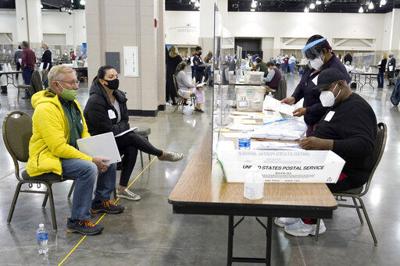The Wisconsin Elections Commission is considering rules that will govern the conduct of people who observe elections, including in November when the state could play a pivotal role in deciding the next U.S. president.
During the last legislative session, Republican lawmakers sought to expand access to poll proceedings for election observers, including letting them stand almost within reach of poll workers and voters. Democratic Gov. Tony Evers vetoed the bill in March.
The commission held a virtual public hearing April 24 to gather input on the proposed rules. The meeting lasted less than an hour and fewer than 10 people provided comment, most of whom raised concerns over what they see as overregulation of election observers.
Current rules stipulate observers must stand between 3 and 8 feet from voters and poll workers. The Election Commission’s draft rules would keep the same distance regulations.
Republican lawmakers, and several of the Wisconsin residents who provided comment during the hearing, said that's too far away for observers to see what's going on.
John Landwehr, a Racine resident who participated as an election observer in 2020, echoed concerns about the distance and cited unfounded claims that ballot drop boxes — which were banned by the Wisconsin Supreme Court in July 2022 — contributed to illegal ballots being counted.
“I want observers to observe each certificate to check for fraud,” Landwehr said, and noted that to do so they need to be closer to poll workers.
Under state law, any member of the public can act as an election observer, either on behalf of a political party or group, or simply because they are interested.
The bill proposed last legislative session sought to allow observers to stand less than 3 feet from voters. Additionally, the bill would have provided observers access to watch any part of the election process, including recounts.
Republican sponsors of the bill argued the proposal would improve the ways observers could watch how poll workers were administering the election. When Evers vetoed the bill in March, he raised concerns that increased access for observers could lead to intimidation of clerks and election workers.
“I cannot support legislation that could enable voter intimidation and prevent election workers from effectively and efficiently carrying out their important duties without interference,” the governor wrote in his veto message.
That's a real concern for Eileen Newcomer, a voter education coordinator for the League of Women Voters of Wisconsin who provided testimony to the commission during the hearing. She spoke in support of the draft rules.
Newcomer noted that the rules included a clear differentiation between members of the media and election observers, access to chairs and bathrooms for observers, accommodations for observers with disabilities and the requirement that poll workers inform observers when a ballot is being remade and why, as well as allowing observers to view rejected absentee ballot certificate envelopes.
The set of rules “strikes a necessary balance between transparency for observers and the ability of election officials to carry out their duties effectively,” Newcomer said.
“Most importantly, it prioritizes voters' rights without intimidation or interference,” she said.
Public trust in elections has been continually hampered by former President Donald Trump’s ongoing false claims that the 2020 presidential election was stolen — a claim that Trump repeated during a campaign rally in Green Bay earlier this month.
Many of these same claims were espoused by Republicans seeking to oust Wisconsin Elections Commission Administrator Meagan Wolfe last year. Those efforts were shot down after a Dane County judge ruled in January that Wolfe could remain in her leadership role.
The Elections Commission, which has three Democrat and three Republican appointees, often comes to a split vote on issues like this that have taken on more partisan characteristics recently.
The board decided in 2022 to reassess the regulations surrounding election observers and has held several hearings on the matter since, the most recent being last November — a meeting which also largely centered on where observers are allowed to stand.
The next time the commission will meet is June 27, at which point the group will consider its draft of regulations along with public comment. Ultimately, the Legislature and the governor will need to review the rule draft before it can take effect.






